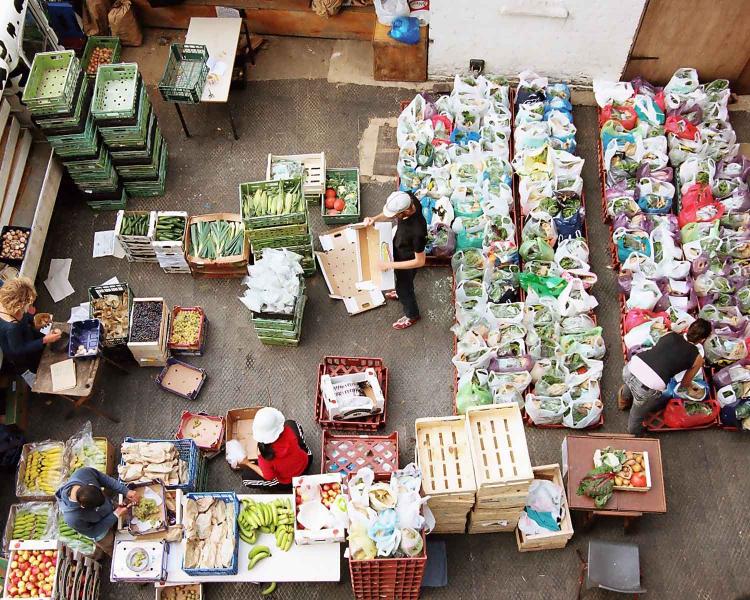Joanna Watson03 Nov 2020
A few months back, Kate Ford heard through a friend of a friend about OwnIt – Friends of the Earth’s peer-to-peer learning programme, aimed specifically at women. They meet in small groups and explore how to make their money work for good, such as supporting renewable energy instead of fossil fuels.
Kate wanted to know how to invest her money and feel empowered to change her bank. She was attracted by the feminist angle, and also wanted to do something that reflected her values, like making changes that supported climate initiatives. She was inspired to take a course on how to host OwnIt groups, which equipped her to go forward and host her own group with a circle of friends and colleagues.
Could the OwnIt model work for food?
But Kate also had a professional reason for engaging with OwnIt. As marketing manager for Better Food Traders, which supports and provides accreditation for ethical businesses to sell sustainably-grown fruit and veg, she wanted to find out whether OwnIt’s model could be adapted to work for them. She thought “OK, let’s see if this genuinely makes me do something and can it help with our mission?”
She took the skills she’d acquired about using peer learning to help individuals align their values with their financial choices, and set up a “Know Better Food” pilot for people who want to buy and eat “better food”. Instead of discussing how personal financial decisions can make a difference to the climate, participants discuss how they might create a food system that’s actually good for people and the planet.
So is it just about individual behaviour change?
Actually it’s not. Although it appears to be about individual action, Better Food Traders wants to explore how to address system change, by marrying individuals’ engagement with the issues to collective action as a group. The Know Better Food programme will play a part in this process.
The small carrot story
Better Food Traders is trying to create a model that shows sustainable alternatives to the current industrialised food system are possible. But people have to want to buy sustainable food and understand why. It’s hard for the small carrot in your veggie box to compete with the glorious array of world foodstuffs on the supermarket shelves unless you also get the bigger picture.
Empowerment through ownership
By adapting the OwnIt model, Kate found a way to support groups of people interested in exploring what’s wrong with the food system and sharing information that helps them take informed decisions. “What I wanted to borrow from OwnIt is how it forces you to reflect what values you place on certain decisions – not telling you what to do but exploring what’s right for you, your family, your community, the planet”.
Because Better Food Traders lists accredited food suppliers, a more informed consumer can find ones that are aligned with a set of thought-through principles – simplifying the steps that lead to supporting local suppliers and linking them to customers.
What problems does Know Better Food address?
More and more people are trying to align what they eat with their values, which has been mirrored by a shift in buying behaviours. But even with the best intentions, conflicting information and green washing make it difficult for people to make ethical choices. Know Better Food aims to help people navigate the plethora of information and connect with their communities – finding an entry point to the food system where they’re supported. The hope is that as more people start questioning their food choices, over time their collective buying power will support the creation of good local food jobs and the growth of new food systems that are local and fair.
Food is inseparable from community
By building groups of passionate and informed people, Know Better Food hopes to create ripples of behaviour change, so that the initiative carries on locally, without central control. These initiatives won’t have much money behind them, so they can’t spread the message through big ad campaigns. It’s all about connection instead – building trust and local relevance that can catalyse community action.
Positive feedback
Know Food Better was piloted with two groups of 10 people from all around the country, who learned about hosting their own groups and gave plenty of insights to build on. Kate has had an enthusiastic response from the pilot groups. One participant described it as “a cleverly put together virtual peer-learning model that’s ground-breaking in its style and interactivity. Taking the core objective of collective transformation to sustainable food, the facilitator programme was multi-layered and hugely engaging. I learned so much about how to communicate the message Know Better Food.”
Measuring impact
When it comes to measuring impact, Know Better Food has had to diverge from OwnIt’s approach. While it’s straightforward to assess the impact of changing pension providers or moving bank accounts by the value of money moved, with food purchases it’s much harder. So practical change will be measured instead – what actions will people take as a result of the course? These could include buying organic veg, stopping using plastic, giving to a food bank, volunteering at a local community farm, writing to their MP about food and the climate crisis, or buying from local farm shops. There are so many ways to use the food system lens once you start.
Who worked with Know Better Food?
Friends of the Earth – who were completely open to sharing all its resources, its OwnIt model, and the research that informed its programme.
Ethical Consumer magazine – supported the creation of more challenging articles that outlined key issues, (such as what is trading fairly, how to navigate greenwashing, what is a sustainable diet that’s good for people and planet etc.
EnrolYourself, whose is mission to drive wider participation in lifelong learning and development, has a facilitation model where the power of peer groups to make change is central. It built on its expertise and insights for Friends of the Earth in setting up the Know Better Food pilot.
So far so good
Kate says the fact that it’s all gone so smoothly is down to the power of sharing – “why reinvent the wheel when you can build on good ideas and good practice?” Better Food Traders is still trialling and assessing this new approach and refining resources. But by the time the 20 trained hosts have recruited and run their own Know Better Food sessions, it’s likely over 80 people will have engaged in this process by the end of January 2021.
Kate acknowledges that the Know Better Food model may not be easily transferable to poorer communities, who are often not in a position to make these choices. But she says whether you are privileged or not, if you have the opportunity to make change, then you should use it for good and hopefully it will benefit your community in the longer term.
So what’s the vision for Know Better Food?
Kate is trying to be methodical about finding out what works and whether it’ll have the hoped for impact, so she doesn’t have a concrete vision yet.
But she does have a dream – a collective of people passionate and informed about the impacts of the food system, who are making choices in their lives to help create a new way of doing things.
Contact Better Food Traders for further information. If you would like to hear more about Money Movers, visit our resource hub.


